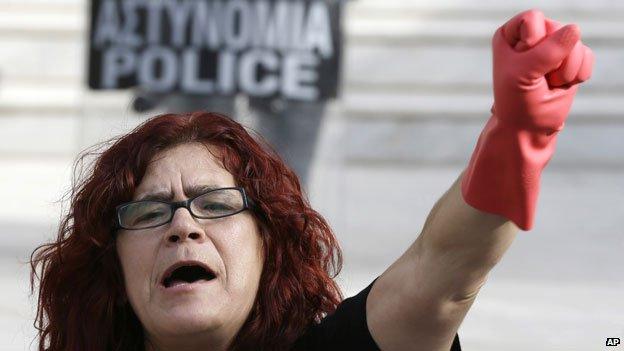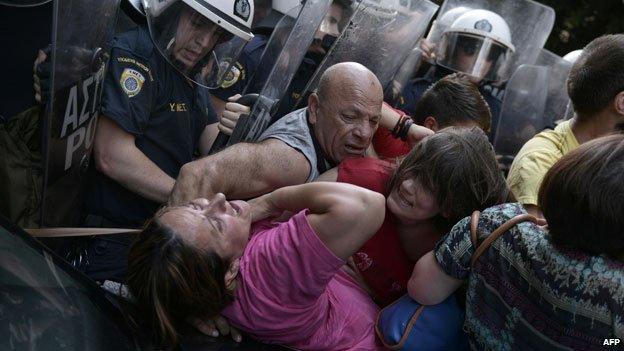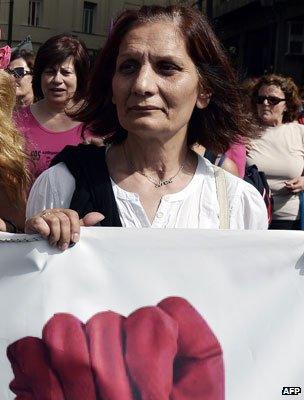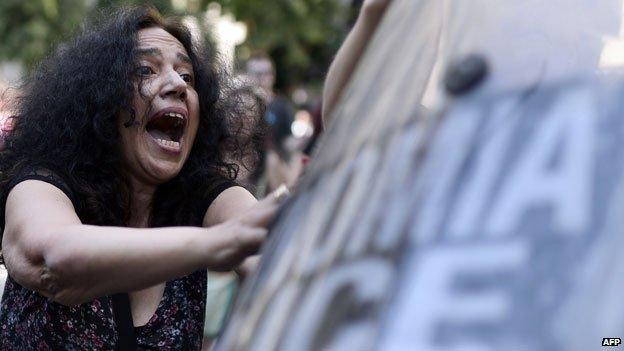The rubber glove rebellion
- Published

A group of middle-aged cleaners have become heroes to Greeks hit hard by austerity for refusing to go quietly when their jobs were cut. They have clashed with police and camped for months in central Athens - their defiance springing from decades of low-paid work and hard lives as mothers, wives, widows or divorcees.
You wouldn't know to look at it that the messy makeshift camp is the epicentre of a protest that's touched a nerve in Greece - and given the government more than a mild headache.
There's a pop-up tent with an inflatable mattress, some plastic chairs, a table, a fridge and a microwave. Posters of red rubber gloves making fists or victory signs adorn the concrete pillars. A banner made from a sheet is splashed with big red letters: "Sit-in protest by the cleaners of the finance ministry."
Nearly 600 women who cleaned the ministry's offices around the country were laid off 16 months ago in public-sector cuts demanded by Greece's creditors. They are middle-aged mothers and grandmothers with no previous experience of activism, but their dogged persistence has caught the imagination of many thousands here whose lives have been derailed by the economic crisis.
They have camped outside the ministry around the clock since May, clashed with the riot police, and sprayed red footprints on the pavements to protest against domestic violence. Their red rubber gloves and purple flags are instantly recognisable at every demonstration. They have become an emblem of the defiant discontent that now looks set to lift the young left-wing party, Syriza, to power later this month - and that could change Europe's future.

Cleaning, the women say, is never a career choice. They've experienced all the ordinary setbacks women face - no childcare, widowhood, divorce, abusive husbands. But their lives also tell a broader story, about what's happened to Greece in the last 40 years.
Many of the cleaners were born in rural poverty and have worked since they were children.
Lily, 46, welcomes me to the camp. She's waiting for the night shift, which comes on at 11pm. At first she speaks the public language of the protest - "All we want is a job so we can support ourselves and our families" - but when I ask about her own story, she softens.
She grew up in a mountain village in the north of Greece, helped her family in the fields and left home at 16 to work in Corfu hotels. Now her elderly parents' pensions have been slashed, and more than half their income goes on medicines, but they're helping to support her. "The thing that saves us," she says, "is that in the village, my mother has a little garden. Apart from meat, everything we eat comes from there. Tomatoes, peppers, courgettes, beans, salad..." These days, that's how many Greeks survive - at least those who are lucky enough to have some land in the village.

Dina Papoutsi got her cleaning job through an MP
Anastasia Nomikou, 49, lives in Perama, one of Athens' poorest suburbs, out near the oil refineries. She tells us she started work in a shoe factory in the port of Piraeus at 13, putting stickers on pairs of trainers. Her former husband, four years older, began to follow her home and asked for her hand in marriage. "I didn't know what was happening. I was still playing with dolls," she says.
Vaso Gova, also in her 40s, went to work in a sweatshop when she was only 11, pulling loose threads from the shirts and hiding on a high shelf when the government inspectors came.
Dina Papoutsi was sent to Athens at 13 to be apprenticed to a seamstress. She worked in the rag trade sewing wedding dresses and never went back to school.
But in the 1980s and 90s, cheaper goods arrived in Greece from abroad. The factories closed or moved away in search of cheaper labour. Both the socialist party, Pasok, and conservative New Democracy handed out public sector jobs to their supporters. A job in the public sector was seen as the dream ticket, a firm foot on the ladder to the middle class.
That's how Papoutsi, now close to retirement age, became a government cleaner 20 years ago. She asked the MP from her husband's village to find something for her. "And since I didn't know letters," she tells me, "he said, 'I'll put you somewhere as a cleaner.'"
Her daughter, Maria, 33, interrupts from the balcony of their small flat in a suburb of Athens: "Rousfeti - jobs for votes."
"This is the Greece our parents made, and our grandparents," she says. "When you have a government that does all these favours, and we go on voting for them because we're comfortable—all this has turned against us. But that's how we were taught to be."

The crisis has deepened an old rift between the public and private sectors. Public sector wages have been slashed by more than a third, but many more jobs have been lost by private sector workers, and if they still have a job they often don't get paid for months, or not at all. Some people resent the Finance Ministry cleaners, saying they've had it easy all these years and are complaining now because they've lost their privileges.
But Papoutsi tells me she spent hours on buses every day to get to her job, and Lily says she was making only 6,000 euros (£4,600) a year, even though she was often asked to take on extra work. Until 2005, when the conservative government made them permanent, the cleaners had no security, no paid holidays, no right to maternity leave. They are fighting, one of them says, for all workers' rights, which have been drastically rolled back under the bailout programme.
That includes the employees of the private companies who've taken over their jobs. In the working-class neighbourhood of Peristeri I meet Vlasia Dimitrakopoulou, who was laid off from a public hospital in 1996. She's organised a union for private sector cleaners and tells me about rates of three euros (£2.30) per hour, unpaid wages and undocumented workers, sexual harassment, violence. "If you complain," she says, "the employer just laughs at you. 'Do you know,' he says, 'how many are waiting outside?'"
Yannis Karouzos, who describes himself as a conservative labour lawyer, says labour law has changed so fast since the crisis began that he's now moved two-thirds of his archive to the basement. In Greece, he says, the employer has "become king".
"He can now summon a worker into his office and ask him to accept lower wages and, if he refuses, fire him with no problem," Karouzos says.

Greeks are flocking to Syriza and its leader Alexis Tsipras
He represents the cleaners in their legal battle. Last year, when they were put on partial wages pending probable dismissal, they sued the government for breach of contract. The District Court ordered their immediate reinstatement, but the government then appealed to Greece's Supreme Court. The final judgment is pending on 24 February - and Karouzos suggests that the outcome will depend on which party's in government.
Two weeks before the election, polls indicate that it's likely to be Syriza, which has promised to end austerity, renegotiate Greece's bailout agreement and restore labour rights. Syriza has cultivated a close relationship with the cleaners, helping with fares and food and especially publicity. One of the women was elected to the Athens regional government on Syriza's ticket in May, and Syriza's representatives in Brussels invited some of them to raise their red rubber gloves in the European Parliament.
There's a long tradition in Greece of political parties taking over independent movements - it's called kapelloma, or putting a hat on something. But Dikaios Psikakkos of Solidarity for All, a Syriza community project, laughs at the suggestion that the cleaners are Syriza's puppets. "That would be great but it's not happening," he says. "They're not small children. They've been working for many years. They listen to what everyone who's supporting them says, but in the end they make their own decisions."
Kyriakos Mitsotakis, the conservative government's Minister for Administrative Reform, says Greece has been under huge pressure from its creditors: "We had to fire, by the end of 2014, 15,000 public sector employees. We tried to do it in a manner which was as fair and as objective as possible," he says. "We also made it very clear from the beginning that setting quantitative targets for layoffs is not the best way to go about reforming public administration. Unfortunately we were faced with a very harsh reality - if you don't fire people you don't get the money."
But the cleaners argue that the government chose to lay off the most vulnerable and powerless - and that they were chosen to go because no-one thought they would protest. For them, and for hundreds of thousands of others who've been devastated by austerity, Syriza now looks like the only game in town. Disillusioned with the mainstream parties that brought Greece to this point, desperate for relief from the endless cuts and tax rises, Greeks are flocking to the young left-wing party and its leader, Alexis Tsipras.
Some of the cleaners were present at his speech earlier this month kicking off the election campaign. Across the packed auditorium, he called out to them: "I see and salute the cleaners of the Finance Ministry. We raise the red fist! Your struggle has been a struggle for dignity, for the dignity of the Greek people. We'll follow you, and we'll win."
In Brussels and Berlin, the thought of a Syriza victory is cause for anxiety. But in the cleaners' camp outside the Greek Finance Ministry, hope is running high that Tsipras will not only win but keep his promises.
Subscribe to the BBC News Magazine's email newsletter to get articles sent to your inbox.